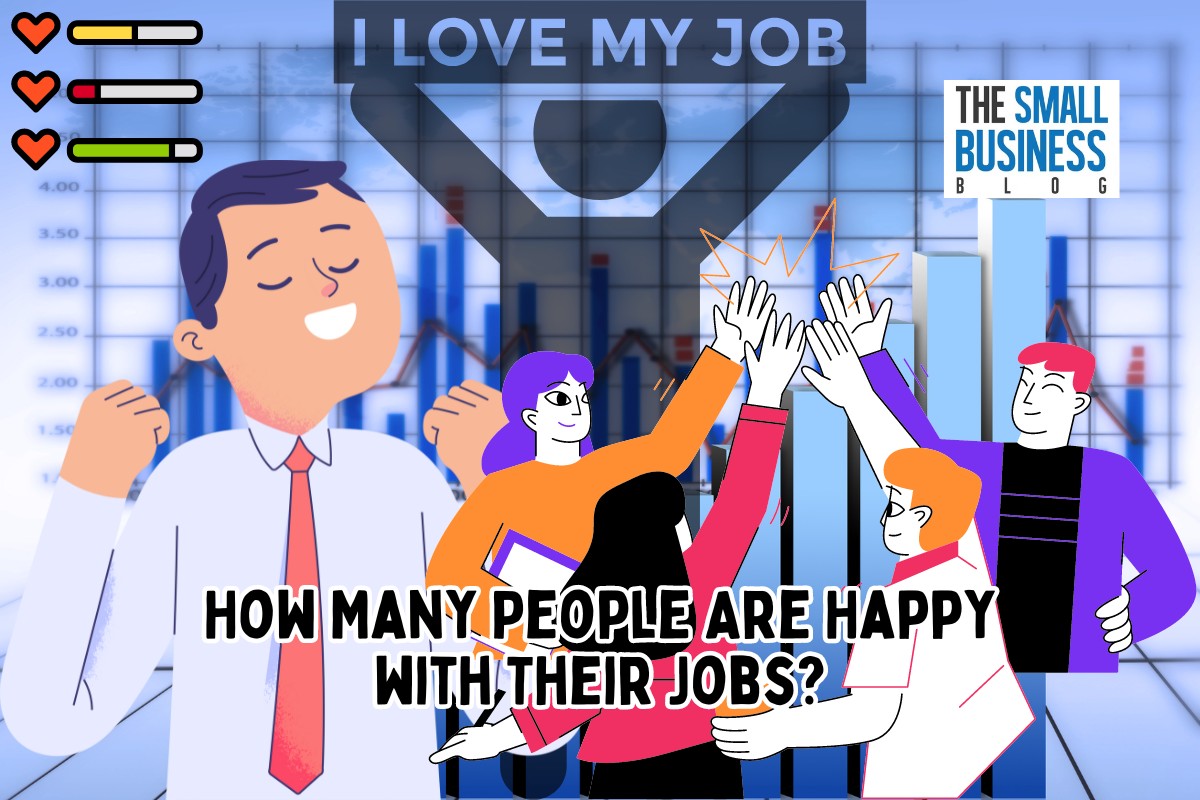After doing some research, we found that just over 60% of American employees are happy with their jobs.
At least that’s over half of them.
Moreover, surveys and studies are showing that job satisfaction/happiness is steadily improving and increasing.
That’s significant data for workers, employers, and marketers.
In this resource, we will discuss data related to employee happiness and learn about how many people are happy with their jobs.
Post Contents
- 1 Key Statistics
- 2 How Many People Are Happy with Their Jobs?
- 2.1 1. Most surveys among American workers show that 65% of them are satisfied with their jobs.
- 2.2 2. 49% of American employees say they are very satisfied with their careers.
- 2.3 3. Nearly 100 million workers in America said they are moderately or somewhat happy with their jobs.
- 2.4 4. 57% of remote workers say they are happy with their jobs.
- 2.5 5. 50% of people who work in an office are happy in their roles.
- 2.6 6. 67% of workers say they are happy with their relationships with co-workers.
- 2.7 7. 60.1% of American workers said they are satisfied with their level of work-life balance in 2022.
- 2.8 8. Job satisfaction is 20 points higher than in 2010.
- 2.9 9. 81% of employees in the legal field say they are bored.
- 2.10 10. Only 20% of employees feel passionate about their jobs.
- 3 10 Bonus Statistics
- 4 FAQs
- 5 Conclusion
Key Statistics
- Most surveys among American workers show that 65% of them are satisfied with their jobs.
- 49% of American employees say they are very satisfied with their careers.
- Nearly 100 million workers in America said they are moderately or somewhat happy with their jobs.
- 57% of remote workers say they are happy with their jobs.
- 50% of people who work in an office are happy in their roles.
- 67% of workers say they are happy with their relationships with co-workers.
- 60.1% of American workers said they are satisfied with their level of work-life balance in 2022.
- Job satisfaction is 20 points higher than in 2010.
- 81% of employees in the legal field say they are bored.
- Only 20% of employees feel passionate about their jobs.
How Many People Are Happy with Their Jobs?

1. Most surveys among American workers show that 65% of them are satisfied with their jobs.
Data shows that 65% of employees in America are happy with their job.
Moreover, the happiness meter is the highest among the clergy career, according to PayScale and CareerBliss surveys.
(Apollo Technical)
2. 49% of American employees say they are very satisfied with their careers.
Nearly half of America’s employees claim to be very satisfied with their careers.
This takes from the 65% who are generally happy with their job and tells us that 49% are “very satisfied” with their careers.
(Zippia)
3. Nearly 100 million workers in America said they are moderately or somewhat happy with their jobs.
Data shows that around 100 million American employees claim to be at least somewhat or moderately happy with their jobs.
For reference, Data from December 2023, the civilian workforce in the United States accounted for just under 162 million employees.
Also, there are just over 134 million full-time employees.
(Statista, Zippia)
4. 57% of remote workers say they are happy with their jobs.

Remote workers have a pretty high happiness rate at 57%.
Why might remote workers be so happy?
Most of remote workers are more comfortable working at home, which makes then more productive.
(Apollo Technical, Tech Report, Zippia)
5. 50% of people who work in an office are happy in their roles.
Right at around half (50%) of people who work in an office (on-site) say they are happy in their roles.
This shows us that office workers like what they do and are happy doing it.
This isn’t a measure of their passion for the work, but they are satisfied.
(Zippia)
6. 67% of workers say they are happy with their relationships with co-workers.
In terms of specific aspects of a job, employee survey respondents has different perceptions.
For instance, one 2023 Pew Research survey revealed that 67% of workers say they are happy with the relationships they have with their co-workers.
(Pew Research)
7. 60.1% of American workers said they are satisfied with their level of work-life balance in 2022.
In the past few years, work-life balance has been a huge factor for job seekers.
The work-life balance ideal has grown in popularity to the point that by 2022, 60.1% of American employees say they are happy with their work-life balance.
(Money)
8. Job satisfaction is 20 points higher than in 2010.
According to Forbes, job satisfaction has risen by 20 points over the figures from 2010.
For some companies, this has resulted in higher employee retention and profits due to improved employee morale and productivity.
(Forbes)
9. 81% of employees in the legal field say they are bored.
Most people who work in the legal field say they’re bored enough that it makes their job feel less than satisfied.
So, we can surmise that most people working in the legal field, according to survey data, aren’t passionate about their work.
Needless to say, legal jobs don’t make the top of any list for the most satisfying jobs.
(Apollo Technical)
10. Only 20% of employees feel passionate about their jobs.

Research from surveys reveal that there aren’t many people who feel passionate about their jobs.
Just because job satisfaction is there, doesn’t mean happy employees necessarily love their work.
The survey said that only 20% of American workers say they are passionate about their jobs.
(Apollo Technical, Tech Report, Zippia)
10 Bonus Statistics
- Waiters, Expediters, and Home Furnishing Salespeople are among the least satisfying jobs.
- The main reason people say they aren’t satisfied with their jobs is the lack of a living wage.
- The main reason people are satisfied with their job is due to limited stress and regular working hours.
- 45% of Millennials are totally satisfied with their career path or job.
- Data shows that organizations with happy employees outperform companies with low employee happiness rates by 202%.
- Company culture is thought to be the largest contributor to job satisfaction according to 74% of American workers.
- People who work in healthcare and humanities feel they have the most meaningful jobs.
- High meaning and high income are two factors of high job satisfaction.
- 60% of remote workers say they feel more relaxed working from home than they do on-site.
- 51% of American workers aren’t engaged at work.
- American employees aged 65-plus are more apt to find their job satisfying.
FAQs
What does it matter if workers are happy?
Happy employees are productive workers.
That’s the main reason employee happiness matters.
That said, there are no laws (federal, state, or otherwise) that address employee happiness.
However, emotionally, mentally, and psychologically, job happiness plays a role in a worker’s overall mindset, health (mental and physical), and their productivity.
Happy employees also encourage workplace morale.
In fact, happy employees are 13% more productive at work, which boosts the profits of their company.
Can companies boost job satisfaction?
Yes. Companies/employers can improve and boost employee job happiness by listening and learning from their workers.
Here are some figures to back that up:
1. 72% of employees say they want to feel respected.
2. 35% of workers say they want to engage in meaningful work.
3. 18% of employees say they want autonomy.
4. 15% of workers want more job opportunities.
These are some things that can help boost morale and employee happiness in the workplace besides, and including better salaries and benefits.
How is job happiness measured?
One way you can measure your efforts to boost employee happiness is to get feedback from your employees.
For instance, yearly questionnaires can help you measure employee attitudes.
From there, you can put together the data.
Moreover, if you’re an employee, you need to be sure to be honest and forthcoming in your questionnaires since you have the ability to express your thoughts about job happiness.
Conclusion
Since there are several surveys and studies related to job satisfaction, there are also some differences in the data, but overall, it’s somewhat consistent.
Moreover, the surveys and studies were done at different times over the year(s).
As we’ve learned, 100 million workers in America say they are either moderately or somewhat happy with their jobs.
That said, only 20% from one survey said they feel passionate about their work.
We hope you have learned enough about how many people are happy with their jobs to apply it to your own job and business.






























